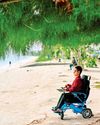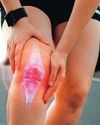
The performance started with a casual conversation, weaving light-hearted humour and engaging questions, putting the volunteer at ease. But Mahadevan's sharp eyes never left her, keenly observing every flicker of her eyes.
"Picture your phone's lock screen," he told the volunteer, his tone layered with intrigue. "Now imagine drawing the pattern in your mind, step by step." Adding to the suspense, Mahadevan extended his hand and asked, "Ma'am, would you shake my hand?" With a theatrical flourish, he clasped her hand, letting the moment linger in charged silence.
Then came the climax. Picking up her phone, Mahadevan paused for a moment, his finger hovering above the touchscreen. Slowly, confidently, he traced the pattern.
The phone was unlocked. The volunteer's wide-eyed disbelief said it all.
Mahadevan followed this with an impressive display of telekinesis, flipping a pair of glasses without touching them, and a series of captivating card tricks.
And he loved the response he got. "Whether it is magic or mentalism, the reaction we get from the audience is what matters the most," said the 17-year-old mentalist, before reflecting on his life-one that has witnessed its own series of magical moments.
Mahadevan was born on October 14, 2004, as the eldest child of Lajeev G.L. and Lija S.K., a couple from Paravur in Kerala's Kollam district. Unfortunately, the baby had severe abnormalities in his renal system.
"At birth, his creatinine levels were elevated, and posterior urethral valves (PUV) were detected," said Lajeev, who works in a scheduled bank. It is a condition caused by a flap of foetal tissue that develops in the urethra during early pregnancy. And it happens only in boys. The flap obstructs urine flow from the bladder, leading to complications such as difficulty urinating, besides kidney damage.
This story is from the January 05, 2025 edition of THE WEEK India.
Start your 7-day Magzter GOLD free trial to access thousands of curated premium stories, and 9,000+ magazines and newspapers.
Already a subscriber ? Sign In
This story is from the January 05, 2025 edition of THE WEEK India.
Start your 7-day Magzter GOLD free trial to access thousands of curated premium stories, and 9,000+ magazines and newspapers.
Already a subscriber? Sign In

Walking in pine forest can have the same effect as a prescription drug
INTERVIEW - KATHY WILLIS, professor of biodiversity, the University of Oxford, and author, Good Nature

MORE THAN A HELPING HAND
Maria Victoria Juan spent a lifetime healing wounded soldiers, and she can't think of anything she could have done better

Against all odds
Mohamed Raishan Ahmed was born with spinal muscular atrophy, which made him unable to sit, stand or walk. Recently, the Maldivian underwent a rare, complex surgery in India that now allows him to sit upright. At 23, the fact that he is alive is in itself an achievement. But he has gone beyond mere survival-with a pursuit of excellence

A pacemaker tale
From science fiction to reality, with a touch of southern Indian wisdom

Driving safe
Taxi drivers endure gruelling hours, cramped seats and relentless traffic, making them prime candidates for health issues like back pain, hypertension, diabetes and insomnia.

Good food, good life
From the moment of birth, we establish a relationship with food—a nourishing link that requires care and attention to stay healthy

POOR SLEEP IN MIDLIFE COULD AGE YOUR BRAIN FASTER
PEOPLE WHO EXPERIENCE SLEEP ISSUES, such as difficulty falling asleep or staying asleep in their 40s, may show more signs of brain ageing in late midlife. Poor sleep may accelerate brain atrophy that is associated with dementia.

BRAIN SCANS SHOW MINDFULNESS MEDITATION CAN REDUCE PAIN
CAN MINDFULNESS MEDITATION actually relieve pain, or is it just a placebo effect?

NON-SURGICAL OPTION TO EASE KNEE ARTHRITIS
A NEW, MINIMALLY INVASIVE procedure called genicular artery embolisation (GAE) can effectively reduce pain, improve quality of life and reduce progression of the disease and the need for knee replacement surgery in people with knee osteoarthritis.

EARLY ONSET DIABETES, BELLY FAT LINKED TO DEMENTIA
FACTORS SUCH AS DIABETES and belly fat in midlife can put you at risk of dementia and Alzheimer's disease later in life.